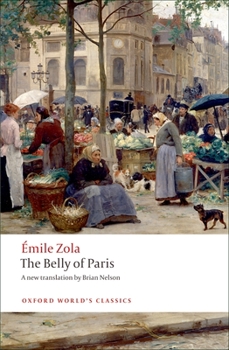The Belly of Paris
(Part of the Les Rougon-Macquart (#3) Series and Les Rougon-Macquart (#11) Series)
Select Format
Select Condition 
Book Overview
Unjustly deported to Devil's Island following Louis-Napoleon's coup-d' tat in December 1851, Florent Quenu escapes and returns to Paris. He finds the city changed beyond recognition. The old March des Innocents has been knocked down as part of Haussmann's grand program of urban reconstruction, replaced by Les Halles, the spectacular new food markets. Disgusted by a bourgeois society whose devotion to food is inseparable from its devotion to the Government, Florent attempts an insurrection. Les Halles, apocalyptic and destructive, play an active role in Zola's picture of a world in which food and the injustice of society are inextricably linked. This is the first English translation in fifty years of Le Ventre de Paris (The Belly of Paris). The third in Zola's great cycle, Les Rougon-Macquart, it is as enthralling as Germinal, Th r se Raquin, and the other novels in the series. Its focus on the great Paris food hall, Les Halles--combined with Zola's famous impressionist descriptions of food--make this a particularly memorable novel. Brian Nelson's lively translation captures the spirit of Zola's world and his Introduction illuminates the use of food in the novel to represent social class, social attitudes, political conflicts, and other aspect of the culture of the time. The bibliography and notes ensure that this is the most critically up-to-date edition of the novel in print. About the Series: For over 100 years Oxford World's Classics has made available the broadest spectrum of literature from around the globe. Each affordable volume reflects Oxford's commitment to scholarship, providing the most accurate text plus a wealth of other valuable features, including expert introductions by leading authorities, voluminous notes to clarify the text, up-to-date bibliographies for further study, and much more.
Format:Paperback
Language:English
ISBN:0199555842
ISBN13:9780199555840
Release Date:September 2009
Publisher:Oxford University Press
Length:320 Pages
Weight:0.74 lbs.
Dimensions:0.7" x 5.0" x 7.6"
Related Subjects
Classics Fiction Literary Literary Criticism & Collections Literature Literature & FictionCustomer Reviews
5 ratings
Hungry for French Lit
Published by Thriftbooks.com User , 15 years ago
This one I bought for me before my trip to Paris. Classic Literature sets the mood for a trip abroad. The book still resonates eight months later.
This novel could have been written today
Published by Thriftbooks.com User , 16 years ago
I live in Paris, so it was interesting for me to read this novel. I can tell you that nothing has changed since Zola wrote this book, except the market has moved to Rungis.
Paris strife
Published by Thriftbooks.com User , 16 years ago
The Belly of Paris (Oxford World's Classics)Who better than Zola to fictionalize the brutal life of the poor in Paris - and the destruction of the old Paris for the much-loved modern, straightened Paris - and their conflict with the bourgeoisie? Also gives a large taste of the old Les Halles marketplace, now replaced by the ugly, "modern" Les Halles shopping mall. Great characterizations. The wonderful opening leads into even greater literary marvels. (This should serve as a warning to politicians thinking about further 'modernizing' Paris and other cities, without concern for what is lost and who is displaced.)
Le VENTRE de PARIS
Published by Thriftbooks.com User , 16 years ago
With a terrific introduction to Zola and his work(s), the translation of THE BELLY OF PARIS is an excellent one! I am certain I will be referring to it many times over not only with studehts but for my own knowledge. I read most of the book while in Paris and that made the book even more impressive and noteworthy. Dr. Alan-Clarke Hudson
A Novel for Food Lovers
Published by Thriftbooks.com User , 28 years ago
From the moment the hero appears -- about to be run down by a row of peasant carts bringing produce to market -- to his denunciation and arrest caused by the swirling jealousies and mutual hatreds of the wholesale food merchants of Paris, this book is a nonstop ode to food. Virtually every page is a food fight of the senses, with pages of sensuous descriptions of every manner of food known to France. Set in Napoleon III's Paris, shortly after the giant Les Halles market was built on the Right Bank (it is now a giant sunken shopping mall near the Pompidou Center), THE BELLY OF PARIS is the story of an escapee from the French penal colony in Cayenne who lives with his brother, a pork butcher, and becomes a seafood inspector. In the process, he becomes a target for the discontents of the gossipy food merchants who are resentful of his left-leaning ways. He and his friends foment a pathetic attempt at a revolution that mirrors what was to become the Paris Commune years later. This is one of the early volumes in Zola's monumental Rougon-Macquart series.






